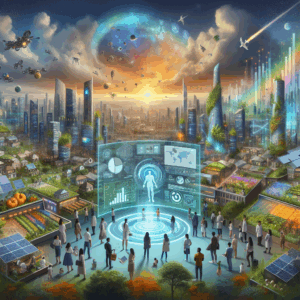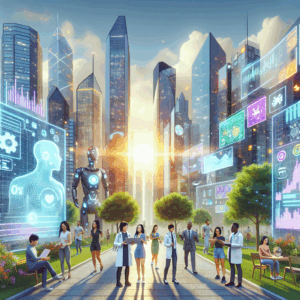The Impact of AI on Daily Life: A Comprehensive Analysis
Artificial intelligence (AI) has become an integral part of modern life, transforming various sectors and influencing how we communicate, work, and live. This blog post aims to explore the profound impact of AI on daily life, highlighting both its benefits and challenges. Whether you’re a tech enthusiast or a business professional, understanding AI’s role in shaping our future is crucial.
Introduction
AI, once a concept of science fiction, is now a reality that permeates every aspect of our lives. From voice assistants like Siri and Alexa to sophisticated medical diagnostic tools, AI is revolutionizing the way we interact with technology and each other. This post will delve into AI’s applications in communication, healthcare, transportation, home automation, and the ethical considerations that come with its widespread adoption.
Understanding AI
What is AI?
Artificial intelligence refers to the development of computer systems that can perform tasks typically requiring human intelligence, such as learning, problem-solving, and decision-making. There are two primary types of AI: narrow AI, which is designed to perform a specific task, and general AI, which aims to match human intelligence across a wide range of tasks.
History of AI
The concept of AI dates back to the mid-20th century, but it wasn’t until recent years that AI began to integrate into daily life. Advances in machine learning and deep learning have enabled AI systems to learn from vast amounts of data, leading to significant improvements in their capabilities.
AI in Communication
AI-powered communication tools have become ubiquitous, enhancing how we interact with technology and each other.
-
Chatbots and Virtual Assistants: These AI-driven tools provide customer support, manage schedules, and perform tasks with ease. For instance, chatbots are used by companies to offer 24/7 customer service, improving user experience and reducing operational costs.
-
Language Translation Services: AI has made language barriers less significant by enabling real-time translation across languages, facilitating global communication.
-
Statistics: A significant portion of the population now uses AI for communication. For example, voice assistants are used by millions worldwide, with over half of U.S. adults using AI large language models like ChatGPT for various tasks[5].
AI in Healthcare
AI is transforming healthcare by improving diagnostics, personalizing medicine, and streamlining administrative tasks.
-
Diagnostics and Personalized Medicine: AI can analyze medical images and patient data more accurately and quickly than humans, leading to better diagnosis and treatment plans. For instance, AI tools can predict patient risks with high accuracy, such as NHS England’s AI tool that predicts falls with 97% accuracy[1].
-
Administrative Tasks: AI helps automate tasks like patient data management and billing, reducing errors and increasing efficiency.
-
Ethical Considerations: The use of AI in healthcare raises concerns about patient data privacy and the potential for biases in AI algorithms.
AI in Transportation
Autonomous vehicles and intelligent traffic management systems are revolutionizing transportation.
-
Autonomous Vehicles: Companies like Tesla and Waymo are leading the development of self-driving cars, which promise to reduce accidents and improve traffic flow.
-
Traffic Management: AI can optimize traffic light timing and route planning, reducing congestion and travel times.
-
Safety Concerns: While autonomous vehicles offer many benefits, they also raise safety concerns, such as the potential for system failures or ethical dilemmas in decision-making.
AI in Home Automation
Smart home devices are making life easier and more convenient.
-
Smart Devices: AI-powered devices like thermostats and security systems can learn and adapt to household routines, enhancing comfort and security.
-
Convenience vs. Security: While AI home automation offers convenience, it also raises concerns about data privacy and device security.
Ethical Considerations and Challenges
As AI becomes more pervasive, several ethical challenges emerge:
-
Job Displacement: AI could replace certain jobs, though it may also create new ones. A recent survey suggests that many people are concerned about job loss due to AI[5].
-
Privacy Issues: AI systems often require vast amounts of personal data, raising concerns about privacy and data protection.
-
Algorithmic Biases: AI algorithms can perpetuate existing biases if they are trained on biased data, leading to unfair outcomes.
Future Trends in AI
Looking ahead, AI is expected to play an even more significant role in various sectors:
-
Sustainability: AI can help optimize resource usage and predict environmental changes, contributing to sustainable development.
-
Education: AI can personalize learning experiences, making education more effective and accessible.
-
Expert Insights: According to experts, AI will continue to integrate into daily life, leading to both positive and negative impacts. For instance, 62% of respondents believe AI will lead to major medical and scientific breakthroughs[5].
Conclusion
AI is transforming daily life in profound ways, offering numerous benefits but also presenting challenges that need to be addressed. As AI continues to evolve, it is crucial for developers, policymakers, and users to ensure that its development and deployment are responsible and ethical. By understanding AI’s impact and potential, we can harness its power to create a better future for all.
External Links:
- Elon University Survey on AI Adoption: https://www.elon.edu/u/news/2025/03/12/survey-52-of-u-s-adults-now-use-ai-large-language-models-like-chatgpt/
- Healthcare AI News: https://histalk2.com/2025/03/12/healthcare-ai-news-3-12-25/





